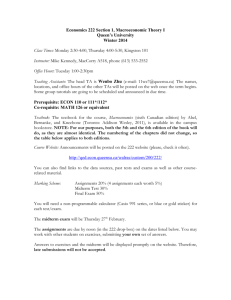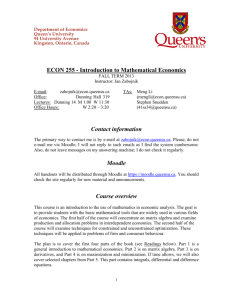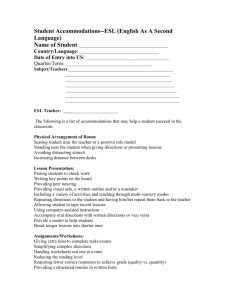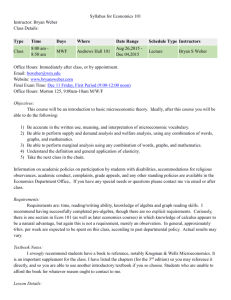Winter 2014 - Queen's University
advertisement
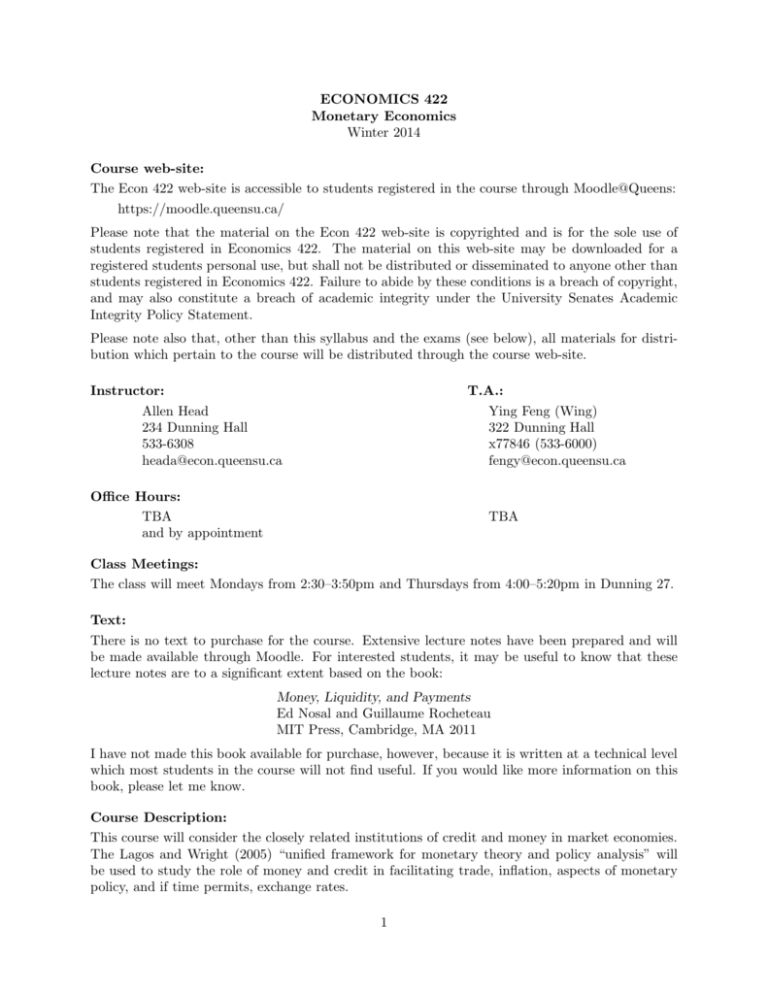
ECONOMICS 422 Monetary Economics Winter 2014 Course web-site: The Econ 422 web-site is accessible to students registered in the course through Moodle@Queens: https://moodle.queensu.ca/ Please note that the material on the Econ 422 web-site is copyrighted and is for the sole use of students registered in Economics 422. The material on this web-site may be downloaded for a registered students personal use, but shall not be distributed or disseminated to anyone other than students registered in Economics 422. Failure to abide by these conditions is a breach of copyright, and may also constitute a breach of academic integrity under the University Senates Academic Integrity Policy Statement. Please note also that, other than this syllabus and the exams (see below), all materials for distribution which pertain to the course will be distributed through the course web-site. Instructor: Allen Head 234 Dunning Hall 533-6308 heada@econ.queensu.ca T.A.: Ying Feng (Wing) 322 Dunning Hall x77846 (533-6000) fengy@econ.queensu.ca Office Hours: TBA and by appointment TBA Class Meetings: The class will meet Mondays from 2:30–3:50pm and Thursdays from 4:00–5:20pm in Dunning 27. Text: There is no text to purchase for the course. Extensive lecture notes have been prepared and will be made available through Moodle. For interested students, it may be useful to know that these lecture notes are to a significant extent based on the book: Money, Liquidity, and Payments Ed Nosal and Guillaume Rocheteau MIT Press, Cambridge, MA 2011 I have not made this book available for purchase, however, because it is written at a technical level which most students in the course will not find useful. If you would like more information on this book, please let me know. Course Description: This course will consider the closely related institutions of credit and money in market economies. The Lagos and Wright (2005) “unified framework for monetary theory and policy analysis” will be used to study the role of money and credit in facilitating trade, inflation, aspects of monetary policy, and if time permits, exchange rates. 1 Course Requirements: The final grade will be a weighted average of marks on homework assignments and two exams: a midterm and a final. The weights used in marking will be: Assignments 15% Midterm Exam 35% or 20% Final Exam 50% or 65% The weighting of the two exams will be chosen automatically to maximize your average. Marking will conform to Faculty of Arts and Sciences “numbers in, letters out” policy. For more information see: http://www.queensu.ca/artsci/sites/default/files/Policy on Grading.pdf While homework assignments will receive a relatively small weight in determining the final mark, they are still very important. This course will be heavily oriented toward setting up and solving explicit problems. The homework assignments will provide practice on problems similar to those that will be on the exams. Late homework assignments will not be accepted. Assignments will be posted as pdf files on the course web-site as they are assigned. Answers will be posted as well, after the assignment due date. Assignments should be handed in using the collection box located on the second floor of Dunning Hall. Note that all assignments should have the economics cover-sheet to facilitate their return by the Distribution Centre, located in 311 Dunning Hall. The midterm exam is tentatively scheduled for 7:00-8:30pm on Wednesday, November 26th, in a location to be announced. The date, time and place of the final exam will be determined by the university-wide final exam schedule. Please read the following statements by the University on academic integrity: Academic integrity is constituted by the five core fundamental values of honesty, trust, fairness, respect and responsibility (see http://www.academicintegrity.org). These values are central to the building, nurturing and sustaining of an academic community in which all members of the community will thrive. Adherence to the values expressed through academic integrity forms a foundation for the freedom of inquiry and exchange of ideas essential to the intellectual life of the University (see the Senate Report on Principles and Priorities at: http://www.queensu.ca/secretariat/senate/policies/princpriplespriorities.html). Students are responsible for familiarizing themselves with the regulations concerning academic integrity and for ensuring that their assignments conform to the principles of academic integrity. Information on academic integrity is available in the Arts and Science Calendar (see Academic Regulation 1) on the Arts and Science web-site: http://www.queensu.ca/artsci. Departures from academic integrity include plagiarism, use of unauthorized materials, facilitation, forgery and falsification, and are antithetical to the development of an academic community at Queens. Given the seriousness of these matters, actions which contravene the regulation on academic integrity carry sanctions that can range from a warning or the loss of grades on an assignment to the failure of a course to a requirement to withdraw from the university. Please also read the following statement on disability accommodations: Queen’s University is committed to achieving full accessibility for persons with disabilities. Part of this commitment includes arranging academic accommodations for students with disabilities to ensure they have an equitable opportunity to participate in all of their academic activities. If you are a student with a disability and think you may need accommodations, you are strongly encouraged to contact the Disability Services Office (DSO) and register as early as possible. For more information, including important deadlines, please visit the DSO website at: http://www.queensu.ca/hcds/ds/ 2 Brief Course Outline The following is a list of topics that will be covered in the course, roughly in the order that they will be considered. Details will be provided and updated regularly on the course web-site. 1. Introduction: An Approach to Studying the Role of Money in a Market Economy 2. A Basic Theoretical Framework 3. Pure Credit Economies A. Competitive (Walrasian) Equilibrium B. Bi-lateral Matching C. Full vs. Limited Commitment 4. Money in Equilibrium A. A Constant Stock of Money B. Inflation i. Stationary vs. Non-stationary equilibria ii. Welfare Implications 6. Money, Credit, and Banking A. Full Commitment B. Limited Commitment C. On the Optimality of Inflation with Limited Commitment 6. Monetary Stabilization Policy 7. (If time permits...) Competing Media of Exchange: The characteristics of money, shortages, multiple currencies and exchange rates. 3
